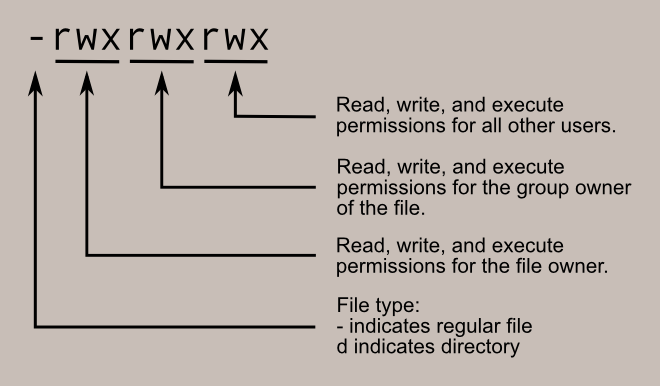[Linux] commands(一)
看linuxcommand.org逐步學習Linux指令
Shell, Terminal
What is the Shell --> the shell is a program that takes commands from the keyboard and gives them to the operating system to perform. ex: bash, zsh
What is a Terminal --> It's a program called a terminal emulator. This is a program that opens a window and lets you interact with the shell. ex: gnome-terminal, xterm
command -options arguments
Host name
$ hostname 顯示我們這台電腦的hostname
$ cat /etc/hosts也可以
Navigation
$ pwd: print working directory
$ cd: change directory
$ ls: list files and directories
$ ls -l: in long format
a close look of long format:

ubuntu bash已經內建一些好用alias:
alias ll='ls -alF'
alias la='ls -A'
alias l='ls -CF'
如果$ cd後面沒有接參數, cd就會把working directory從目前的目錄切換到/home/yourusername
$ less text_file : let you view text files. 可用page up , page down, G到檔案底部, 1G到檔案開頭, 也可/characters search ,用nrepeat previous search
$ file name_of_file: file will examine a file and tell you what kind of file it is.
例如:
$ file 2015-08-28-git_9_remote_branches.html
2015-08-28-git_9_remote_branches.html: HTML document, UTF-8 Unicode text, with very long lines
Manipulating Files
cp: copy files and directories
mv: move or rename files and directories
rm: remove(delete) files and directories
mkdir: create directories
可以這樣: mv file1 file2 file3 dir1
Working with Commands
type: display information about command type
$ type gla
gla is aliased to `git la'
$ type ls
ls is aliased to `ls --color=auto'
$ type ll
ll is aliased to `ls -al'
$ type cp
cp is /bin/cp
which: locate a command
$ which ls
/bin/ls
$ which git
/usr/bin/git
help
man
I/O Redirection
send to standard output:
$ ls > file_list.txt
$ ls >> file_list.txt
standard input:
sort: sort lines of text files
$ sort < file_list.txt
注意:
$ sort < file_list.txt > sorted_file_list.txt
會先執行sort < file_list.txt 將結果output到 sorted_file_list.txt
cmd Pipelines
The standard output of one command is fed into the standard input of another:
$ ls -l | less
the output of the ls command is fed into less.
filters: take standard input and perform an operation upon it and send the results to statndard output.
通常命令組合跟filter搭配, 例如sort, grep, fmt, sed, awk
Permissions
chmod: modify file access rights
su, sudo: temporarily become the superuser (在ubuntu用sudo)
chown: change file ownership
chgrp: change a file's group ownership

Job Control
ps: list the processes running on the system
kill: send a signal to one or more processes (usually to kill a process)
jobs: an alternate way of listing your own processes
bg: put a process in the background
fg: put a process in the forground
按 Ctrl-Z 表示將process暫停, 該process還在
alias
$ alias 列出所有bash alias
將aliases抽出到~/.bash_aliases,
.bash_alias + vim highlight
要讓vim可以顯示.bash_aliases語法標示, 需用root修改/usr/share/vim/vim74/filetype.vim, 搜尋bashrc, 在:
au BufNewFile,BufRead .bashrc*,bashrc,bash.bashrc,.bash_profile*,.bash_logout*,*.bash,*.ebuild call SetFileTypeSH("bash")
加入.bash_aliases即可
group & user 管理
列出你所屬的group : $ groups
$ groups yourusername 或 $group root 列出該user所屬的group
或是:
$ id -Gn
$ id -Gn yourusername
$ id -Gn root
find out my primary group membership:
$ getent group yourusername
yourusername:x:1000:
user yourusername has group id # 1000 and has group name yourusername for primary group membership.
列出所有group: /etc/group 或是: getent group | cut -d: -f1
cat command
cat filename 讀取檔案
cat > filename 建立新檔案
cat file1 file2 > file3 合併檔案
預設cat會把output輸出到螢幕, 現在redirect到另外一個檔案:
$ cat /etc/passwd > /tmp/test.txt
或是:
$ cat /etc/hosts /etc/resolv.conf /etc/fstab > /tmp/outputs.txt
$ cat /tmp/outputs.txt
新增檔案(save and exit 按下ctrl+D):
$ cat > foo
this is a test
$ cat foo
this is a test
$ cat >> foo
more
$ cat foo
this is a test
more
以下COOL!:
$ cat file1 - file2 > file3
-表示鍵盤輸入, 會把file1加上你鍵盤輸入內容加上file2的內容, 輸出給file3
-b(number non-blank), -n(number):
$ cat -b foo
1 this is a test
2 more
3 cc
4 dd
$ cat -n foo
1 this is a test
2 more
3
4 cc